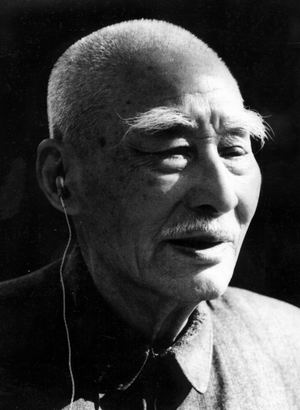



叶圣陶(1894-1988)原名绍钧,字秉臣。江苏苏州市人,著名作家、教育家、出版家和社会活动家。1912年中学毕业后,因家境清贫即开始当小学教师并从事文学创作。五四运动前参加了李大钊、鲁迅支持的“新潮社”。1921年,与沈雁冰、郑振铎等发起组织“文学研究会”,提倡“为人生”的文学观,并与朱自清等人创办了我国新文坛上第一个诗刊《诗》。他发表了许多反映人民痛苦生活和悲惨命运的作品,出版了我国童话集《稻草人》以及小说集《隔膜》、《火灾》等。1923年,叶圣陶进入商务印书馆,开始从事编辑出版工作,并主编《小说月报》等杂志,同时继续文学创作,发表了长篇小说《倪焕之》和大量短篇小说。1930年,他转入开明书店。他主办的《中学生》杂志,是三、四十年代最受青年学生欢迎的读物,在社会上有广泛的影响。“九一八”事变后,他积极投身抗日救亡活动,参加发起成立“文艺界反帝抗日大联盟”。抗战期间,他内迁四川,先在中学、大学执教,后继续主持开明书店编辑工作,同时写下了不少散文小说诗词,从不同角度揭露了旧社会的黑暗和人民的悲惨生活,歌颂了在民族解放斗争中坚强不屈的普通群众。在四川他还参加发起成立“文艺界抗敌后援会”,支援抗日前线的将士。抗战胜利后,他参加反对国民党政府压制民主、争取出版自由的斗争。1946年,叶圣陶回到上海后,积极投身爱国民主运动。他担任了中华全国文艺界协会总务部主任,主持文协的日常工作,还担任了上海市小学教师联合进修会和中学教育研究会的顾问。他编辑杂志、撰写文章、发表演讲,揭露和抨击当局内战、独裁、卖国的罪行,呼吁文化界教育界同人“要有所爱,有所恨,有所为,有所不为;和广大的人民,为同一目标而斗争”,“汇为巨力致民主”,“转移风气,挽回世运”,开创“为万世开太平”的局面。 1949年初,叶圣陶应中共中央的邀请,由上海经香港到达北平,担任华北人民政府教科书编审委员会主任;6月,参加新政治协商会议筹备会;7月,参加第一次文代会并当选为文联全国委员;9月,出席了中国人民政治协商会议第一届全体会议。新中国成立之后,他先后出任中央人民政府出版总署副署长兼编审局局长,教育部副部长兼人民教育出版社社长和总编,教育部顾问,中央文史研究馆馆长;中华全国文学艺术界联合委员会委员,中国作家协会顾问等职,并当选为全国人大第一届至第四届代表和第五届常务委员会委员,全国政协第一届委员,第五届常务委员会委员,第六届全国委员会副主席等重要职务。1962年,叶圣陶加入中国民主促进会,在1979年民进四代大会上,当选为民进中央副主席,1984年9月,出任民进中央代主席,1984年12月,在民进七届二中全会上,当选为民进中央主席。
The Life of Mr. Ye Shengtao (a brief introduction)
Ye Shengtao (1894-1988, born Ye Shaojun, also known as Bingchen) was born in Suzhou, Jiangsu Province. A famous modern editor, educator, writer and social worker, Mr. Ye started his career as a primary school teacher upon his graduation from high school in 1912. Before the beginning of the May Fourth Movement of 1919, Mr. Ye had already written and published many stories and was active in a student organization called the “New Tide Society” with Li Dazhao and Lu Xun. In 1921, Mr. Ye launched and organized The Literature Research Association with Shen Yanbing, Zheng Zhenduo and others, and made “Literature is for Life” and critical thinking the focus of their work. Meanwhile, Mr. Ye, along with Zhu Ziqing and others, founded Poetry, the first poetry magazine of China’s modern literary world. Mr. Ye wrote and published many stories that reflected the bitter life and destiny of the people; he published fairy tales (e.g. “A Scarecrow”) and collections of short stories (e.g. “Gemo” and “A Fire”). In 1923, Mr. Ye began to work for the Shanghai Commercial Press as an editor. Mr. Ye was already the editor-in-chief of several magazines including Novel Monthly. In 1928 Mr. Ye published his famous autobiographical novel, “Ni Huanzhi” and a number of additional short stories. In 1930, Mr. Ye joined the Kaiming Press. He started the magazine, High School Students, which, during the 1930’s and ‘40’s, had a far-reaching influence on Chinese young people and Chinese society as a whole. After the Manchurian Incident, Mr. Ye threw himself into the Anti-Japanese and National Salvation Movements, and initiated the “Literary Alliance of Anti-Japanese Imperialism”. During the Anti-Japanese War, Mr. Ye settled in the Sichuan Province. At first he taught high school and college; then he worked as the managing editor for the Kaiming Press. At that time, Mr. Ye wrote numerous essays, short stories, and poems exploring, from different points of view, the bleakness of old society and the misery in peoples’ lives. He paid tribute to the efforts of society to persevere and struggle for national liberation. In Sichuan, Mr. Ye founded the Anti-Japanese Literary Society, which supported officers and soldiers in the Anti-Japanese front. Following the victory in the Anti-Japanese War, Mr. Ye took part in the battle for fighting against the Kuomintang Party and their suppression of democracy. He also fought for the freedom of press. In 1946, Mr. Ye returned to Shanghai, and dedicated his work to the Patriotism and Democracy Movement. He served as the director and manager of the Department of General Services, the China Association of Literary Circles. At the same time, Mr. Ye was a consultant to the League of Primary School Teachers for Advanced Studies in Shanghai and also to the Research Association of High School Education. In his magazines, articles, and speeches, Mr. Ye revealed and condemned the misdeeds of authorities (including civil war, autocracy and treachery); he called on the literary and education societies to ”have something to love, have something to hate, have something to do and have something not to do; strive for the same goal with the people”, “to turn democracy into reality depending on confluent and titanic power”, “to change the ethos, and to leave the world”, and to set up the ideal “to maintain peace for generations”. In early 1949, Ye Shengtao traveled to Beijing via Hong Kong, at the invitation of the Central Committee of the Communist Party of China, and served as the director of the North China People's Government’s Committee of Schoolbook Compilation. In June of the same year, Mr. Ye attended the preparatory meeting of the New Political Consultative Conference. In July, he attended the first representative meeting of the China Federation of Literary and Art Circles and was elected as a member of that organization. In September, Ye was present at the 1st plenary meeting of The Chinese People’s Political Consultative Conference. After the founding of the People's Republic of China, Mr. Ye successively held many important posts including:
1.Vice-Director of Publication Administration of the Central People's Government,
2.Compilation Office Director,
3.Vice-Minister of the Ministry of Education,
4.President and Editor-in-Chief of the People’s Education Press,
5.Advisor to the Ministry of Education,
6.Curator of the Central Research Institute of Culture and History,
7.Member of the China Federation of Literary and Art Circles,
8.Advisor of Chinese Writers Association
9.Deputy of 1st - 4th National Peoples’ Congress and Standing Committee,
10.Member of the 5th National Peoples’ Congress,
11.Member of the 1st National Committee of CPPCC,
12.Standing Committee member of the 5th National Committee of CPPCC and
13.Vice-Chairman of the 6th National Committee of CPPCC.
In 1962, Ye Shengtao joined the China Association for Promoting Democracy. In 1979, Mr. Ye was elected as Vice-Chairman of the 4th National Congress of the China Association for Promoting Democracy.In September 1984, Mr. Ye took up the post of sub-chairman of the China Association for Promoting Democracy.In December 1984, at the Second Plenary Session of the 7th Central Committee ,Ye Shengtao was elected as chairman of the China Association for Promoting Democracy.